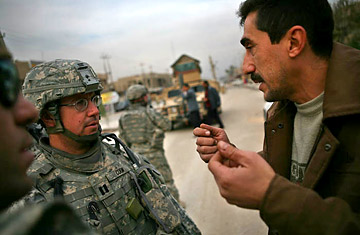
Captain Cook speaks with a resident of Dora, Iraq.
When Captain Nicholas M. Cook arrived in the Dora neighborhood of southern Baghdad in May, the place was like a ghost town. Nearly 50% of the homes were abandoned and the residents that remained rarely ventured out. Only the crackle of gunfire pierced the streets. "Everyday it was like clockwork — 10 to 11:30 am gunfire would start. They would break for lunch and then start up again in the afternoon," says Cook, a West Point graduate from Lansing, Michigan who is on his second tour in Iraq.
Dora is an affluent, upper-middle class neighborhood, home to many former Iraqi army generals and intelligence officers, almost completely Sunni and Baathist. It was just the kind of place hit hard by the 2003 orders to disband the Iraqi army and purge the government of ranking Baath party members.
Cook's unit managed to turn the area around by patrolling 24-hours a day and putting up walls to choke off the flow of insurgents from the low-lying areas to the south. They went house to house, meeting every family they could find, asking about their problems, offering to help where they could and in the process building a network of reliable contacts and informants. They called these operations called 'close encounters'.
They also cleaned up the community, investing heavily in infrastructure, building sidewalks, clearing trash, painting walls, and installing generators and new sewage lines where the government failed to provide them, all while fighting off insurgents. They refurbished a clinic and paid to upgrade a primary school.
Today the neighborhood's abandonment rate is closer to 5%; where there used to be just 11 shops, 160 shops are now open on the main street. There hasn't been a major incident against Cook and his men for almost three months. (He lost five men while routing out insurgents and turning the neighborhood around; about a third of his men have been awarded Purple Hearts). Between Cook's area and an adjoining one, the U.S. spent close to $3 million, jumpstarting the local economy by hiring and sourcing locally. Another $4.7 million is budgeted for future projects.
